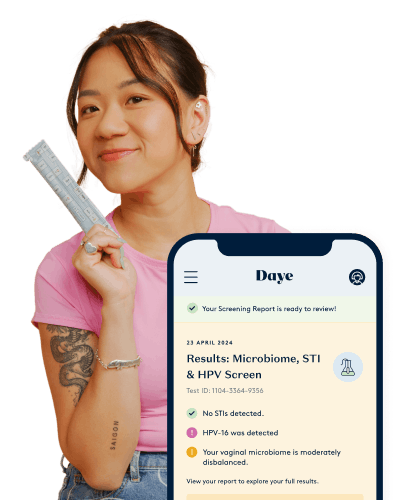Written by Liv Cassano
Illustrated by Erin Rommel
You’ve probably heard all about the bacteria in your gut and how it’s linked to overall health, but chances are you’re less acquainted with the bacteria living in your vagina, AKA your vaginal microbiome.
Deep-dive into your gynae health
Stay on top of your vaginal health with Daye's microbiome screen.

Your vaginal microbiome – sometimes referred to as vaginal microbiota – is crucial for overall health. It affects everything from your ability to fight off infections, to your likelihood of getting pregnant, miscarrying, and even of developing certain cancers.
Good vaginal bacteria
There are several different types of bacteria that make up your vaginal microbiome, but Lactobacilli are the most important. You know how the vagina is self-cleaning? Well, that’s all thanks to Lactobacilli.
Lactobacilli are basically the MVPs of the vaginal microbiome. They produce lactic acid and hydrogen peroxide that lowers the vagina’s pH level to about 3.8-4.5, making it very acidic and preventing the growth of harmful pathogens like E. coli, Staph and Candida. Lactobacilli are the good bacteria responsible for fighting infections like thrush and BV, two very common vaginal infections.
Every woman’s vaginal microbiome is completely unique and there's no one-size-fits-all, however research shows that having less than 90% lactobacilli puts you at risk of vaginal dysbiosis.

Just like your gut, your vagina is home to billions of bacteria (some good, some bad). These make up your vaginal microbiome. When it’s disrupted, you’re at greater risk of developing infections like thrush and BV.
Daye's ProViotics strengthen your vaginal microbiome so it can fight off harmful bacteria on its own.

Good bacteria can lower your risk for STIs
Having higher levels of lactobacilli in your vaginal microbiome has been linked to a lower risk of sexually transmitted infections (STIs) as well as pelvic inflammatory disease (PID).
Newly published research by The Eve Appeal and a team at UCL has even found that women with less lactobacilli in their vaginal microbiome may be at greater risk of developing ovarian cancer.
Good bacteria may help prevent preterm labour
Emerging evidence suggests that having lower levels of lactobacilli in your vaginal microbiome during pregnancy also puts you at higher risk of pregnancy complications like preterm birth and miscarriage.
A 2015 study concluded that “pregnancy outcomes might be predicted by features of the microbiota early in gestation”, linking lower levels of lactobacilli and higher levels of bad bacteria like Gardnerella and Ureaplasma with a higher risk of preterm labour.
However, it’s worth noting that premature labour is often caused by several factors, and the link between pregnancy outcomes and vaginal microbiota is still young.

What causes vaginal pH imbalances?
Maintaining a healthy vaginal microbiome is essential for infection-fighting lactobacilli to thrive, so keeping your vagina happy is imperative.
The general rule of thumb is that whatever you insert in your vagina has the potential of disrupting your vaginal microbiome. Here are some of the biggest vaginal microbiome disruptors:
Personal hygiene products
Vaginal washes, deodorants and douches tend to make the vaginal environment more alkaline, allowing bad bacteria to take over. Excessive washing also flushes away healthy bacteria, making it easier for harmful pathogens to colonise. One study found that women who used vaginal douching were more likely to report having BV.
“It's important to understand that a “clean” vagina just means well-populated with good bacteria,” says Dr. Harry Baxter, Daye’s Deputy Head of Research. “Wiping out all the bacteria will makes things worse. Also, your vagina is self-cleaning by producing cervical fluid full of immune cells. Most gynaecologists don't advocate internal cleaning products.”
Your vagina also likes staying at body temperature (37ºC), and anything warmer creates the perfect breeding environment for bad bacteria and yeasts to take over. So, despite what you might have read on the internet, we (and our medical advisory board…) recommend you avoid vaginal steaming.
Antibiotics
Broad-spectrum antibiotics can change the make-up of your vaginal microbiome. Not only do they get rid of bad bacteria, but they can also eliminate Lactobacilli and giving bad bacteria the opportunity to prosper. Overuse of antibiotics makes refractory infections more difficult to treat, and can also lead to antibiotic resistance.
Intercourse
Having unprotected sex with a male partner not only puts you at risk of contracting STIs or unwanted pregnancies, but it can also impact your vaginal microbiome and alter your vaginal pH. Semen has an alkaline pH, which can make your vaginal environment less acidic. This can allow bad bacteria to thrive, at the expense of the healthy ones. Always use protection, people!
Tampons
“Tampons can provide a breeding ground for bad bacteria, as they can be hidden away from your body's immune system and the resident good bacteria,” explains Dr. Baxter. “This is why you shouldn’t wear the same tampon for more than 8 hours, and why it's important that tampons are not made from materials that might promote growth or harbour bacteria.”
Your period
Menstrual blood has a slightly alkaline pH (around 7.4), so prolonged or irregular bleeding patterns can make your vaginal environment less acidic, which could allow bad bacteria to take over.
Contraception
Some forms of contraception, like the combined oral contraceptive pill (COCP) and the copper coil may put you at higher risk of recurring infections like thrush and BV.
Should you use vaginal probiotics?
While the practice of consuming good bacteria for your gut is well established, very few of us are well-versed on how to look after our vaginal flora. No surprise here, given society’s cultural aversion to vaginas.
Although probiotics aren't currently part of UK guidelines for the management of gynaecological disorders like thrush and BV, research in this area is promising. If you're worried about having low levels of healthy bacteria in your vaginal microbiome, probiotic supplementation could replenish the lactobacilli in your vagina – especially when administered vaginally rather than orally.
“Probiotics are an excellent method for giving your good bacteria a helping hand – by introducing some other good bacteria to stand in while they get back on their feet,” says Dr. Baxter.
“However, there's unfortunately a lot of probiotics on the market that haven't been appropriately tested. Very few probiotics can cause harm, but some are more efficacious than others.” So the worst case scenario is that you waste your hard earned cash.
TL;DR
- The vaginal microbiome is the ecosystem of bacteria, yeasts and other microorganisms that live inside your vagina.
- Lactobacilli are the healthy bacteria that keep your vagina healthy. They produce lactic acid that inhibits the growth of pathogens.
- Lactobacilli also maintain an acidic vaginal pH, necessary to stave off infection.
- Your vagina is a self-cleaning organ and doesn’t need internal cleaning. Douching or using intimate hygiene products can strip your vaginal microbiome of lactobacilli. The best way to wash your vulva is to simply use warm water.
- Semen is alkaline and can weaken your vaginal microbiome, so always use a condom during intercourse!
Want to support your vaginal microbiome? Daye's vegan, allergen-free good bacteria supplement has been clinically validated to support the vaginal microbiome. Available here.
See our Founder’s results!
Wondering what we test for, and what results look like? Enter your email below and Valentina, our Founder, will send you her screening report.
By entering your email above you agree to receive marketing emails and promotions from Daye.






